Thomas Mann House Events Archive
December 2019
Democracy under Threat? The Role of Media in the Age of Populism
Berlin
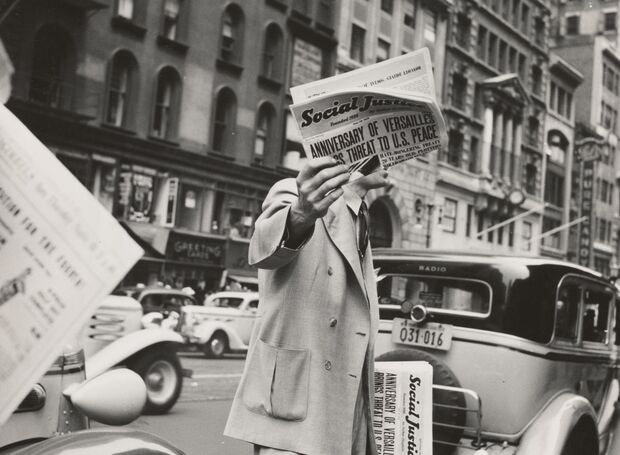
with
Karen Attiah
Global Opinions Editor, The Washington Post
Ines Pohl
Editor-in-Chief, Deutsche Welle
moderated by
Barbara Junge
Deputy Editor-in-Chief, taz
The media is increasingly under attack. Its role as the fourth estate in democracies is eroding and many doubt its position as fair arbiter of information. How should media react to the ongoing attacks by increasingly powerful populist forces? How can media retake responsibility and restore trust? Is freedom of the press in danger and, if yes, how can it be defended? What will be the consequences for democracy? What can we expect for the U.S. presidential election in 2020?
This event is part of the series “The Backlash Against Liberal Democracy”, which brings together influential voices from Europe and the United States to shed light on different aspects of the challenges that liberal democracies face. Speakers so far have included Timothy Snyder, Daniel Ziblatt, and Francis Fukuyama.
The event will be followed by a reception.
A cooperation with the German Marshall Fund of the United States and taz. Supported by Robert Bosch Stiftung
Location
taz Kantine, Friedrichstraße 21, 10969 Berlin
To RSVP or if you have any questions, please contact Mirko Lux via email (mirko.lux@vatmh.org) or telephone (+49 30 20623640).
Bringing It All Back Home: Thomas Mann, America, and Democracy
Los Angeles
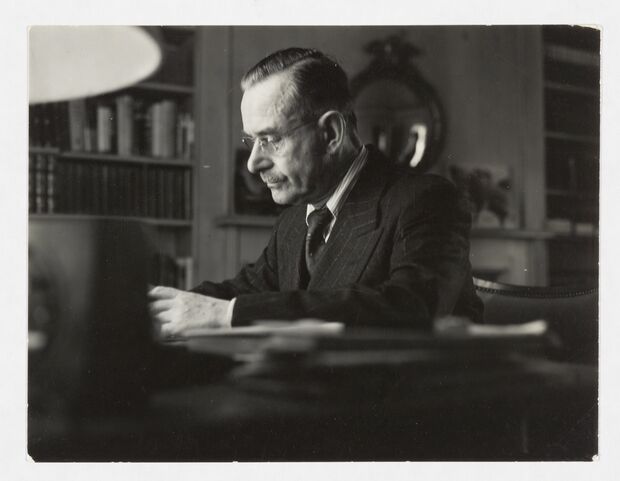
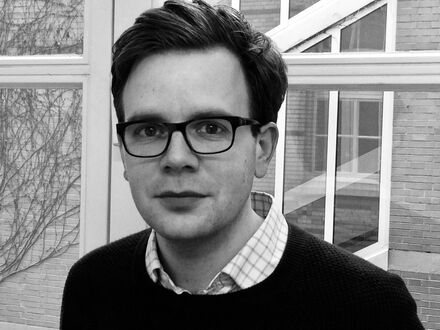
Bringing It All Back Home: Thomas Mann, America, and Democracy
Lunch talk with Kai Sina (University of Göttingen).
As admirable as Thomas Mann's advocacy for democracy in times of Nazi barbarism doubtlessly is—his concept of democracy remains quite extravagant. Critics have stressed this time and again. What he regards as democracy, they consider from the perspective of practical politics as rather naive. But this critical perception is based on a fundamental misunderstanding. Thomas Mann is primarily interested in democracy as a basic condition for our existence as modern beings. Accordingly, his democratic beliefs are not shaped by political theory, but by literature, namely by Walt Whitman, whose writings and works he had already studied in the 1920s. This finally explains why Mann's political engagement in the USA, at least in general, was highly adaptable. As for his understanding of democracy, he, the émigré, did not enter the United States as a stranger—he came home. Lunch talk with Kai Sina (University of Göttingen), moderated by David Kim (UCLA).
Kai Sina is a literary scholar at the University of Göttingen. His research focuses on the history of transatlantic literature. In 2017, he published an essay on Susan Sontag and Thomas Mann. It will be followed this year by a book on “Collective Poetry.” Its subject is the relationship between modern literature and the open society. It includes studies on Goethe, Emerson, Whitman and Mann.
Villa Aurora & Thomas Mann House e. V. is supported by the German Federal Foreign Office and Federal Government Commissioner for Culture and the Media.


"On: Changing Times" - Book Launch with Armen Avanessian
Los Angeles
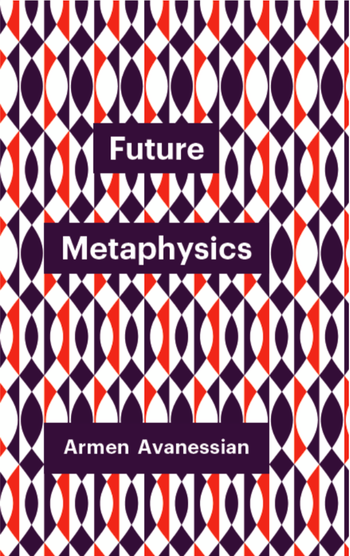
"Future Metaphysics," a new book by Thomas Mann Fellow Armen Avanessian, is to be launched not in a single event, but in a series of real, speculative and symbolic “book launches.” The book launches are an ongoing site of recursive encounters between Avanessian and Los Angeles artists and institutions.
"Future Metaphysics" was originally commisioned as a series of experimental texts corresponding to each room of the Moscow Museum of Modern Art. A series of events now generate from each of the book’s chapters, and unfold across divergent contexts of academic and cultural institutions. LA artists Scarlett Kim, Eric Fanghanel and Parch Es, respond to Avanessian’s activities in the form of microcultural productions: performative strategies, relational scores and media interventions. The collision and intersection between them launches Future Metaphysics, repeatedly and unrelentingly, in a multiplicity of directions. The series captures not only the proposals of the book but the dynamics of the writing process and institutional logics at play. Avanessian and artists contaminate and alienate each other, abolishing the distinction between theory and practice, and rewriting the terms of the “book launch.” A web of connections extend outward from the book like tendrils of slime that assemble and disassemble contingently: from Germany to the US, from Thomas Mann House to Los Angeles universities, from major institutions to grassroots interventions, and from academic environment to art installation.
The event "On: Changing Times" is a conversation between Armen Avanessian and Arne de Boever on the subject of time. The conversation will be intervened by artists Scarlett Kim and Parch Es using a time-altering technique developed by writer William Burroughs.
Armen Avanessian studied philosophy and political science in Vienna and Paris. After completing his dissertation in literature, he worked at the Free University Berlin from 2007–2014. He has previously been a Visiting Fellow in the German Department at Columbia University and the German Department at Yale University as well as Visiting Professor at various art academies in Europe and the US. In Berlin, Avanessian is the editor at large at Merve Verlag and in charge of the theory program at the internationally acclaimed theatre Volksbühne. He is a co-founder of the bilingual research platform Spekulative Poetik (www.spekulative-poetik.de), conducting a series of events, translations and publications. His work is translated into various languages. Forthcoming in German are two monographs, One plus One and I –I (Merve, 2019), both written in collaboration with Anke Hennig. Forthcoming in English is Future Metaphysics (Polity, 2019).
Find more information about the book and the event series here.
Location:
Wednesday, December 4 at California Institute of the Arts
2pm - 4pm
xbox (Main Gallery Conference Room)
24700 McBean Pkwy
Valencia, CA 91355
The event is free for the public
Lecture by Stefan Keppler-Tasaki: “With the Eyes of a Global Citizen.” Alfred Döblin as “Berliner” and Cosmopolitan
Los Angeles

With his representation of the masses, the Berlin novelist and exile writer Alfred Döblin (1878–1957) introduced a new element to modern German fiction. Döblin, who gained international renown with his novel Berlin, Alexanderplatz, rightfully earned his reputation as the bard of Berlin. From the beginning, though, he pursued his epic style not only with reference to Berlin, but also from consideration of such places as China, Warsaw, Paris, and American cities such as Los Angeles, where he lived from 1940 to 1945. A psychiatrist by profession and a proletarian by conviction, he rejected cosmopolitanism as a bourgeois lifestyle but opened up the possibility of a proletarian cosmopolitanism. Hence, his remark in “Impressions of New York” (1939): “As soon as we set foot on American soil, we are poor people, proletarians.” – This lecture deals with the intersection of Döblin’s Berlin images and his international experiences.
USC Lecture Series “Exile and Resistance – Migrants and Refugees in Literature, History, and Public Affairs”. The lecture series is a collaboration between USC Libraries, USC Dornsife’s Department of French and Italian, and USC Dornsife’s Max Kade Institute for Austrian-German-Swiss Studies.
Stefan Keppler-Tasaki is an associate professor of modern German literature at the University of Tokyo’s Faculty of Letters. He was also an assistant and junior professor of modern German literature at the FU Berlin from 2005 to 2012 and is currently a fellow at the Thomas Mann House Los Angeles.
Villa Aurora & Thomas Mann House e. V. is supported by the German Federal Foreign Office and Federal Government Commissioner for Culture and the Media.


Right-Wing (Media) Spaces
Los Angeles
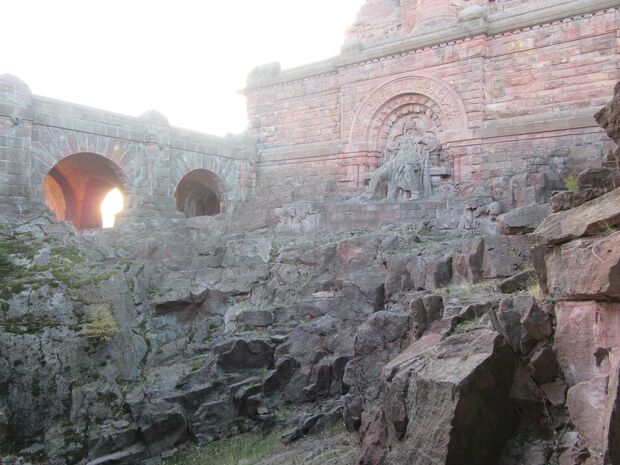
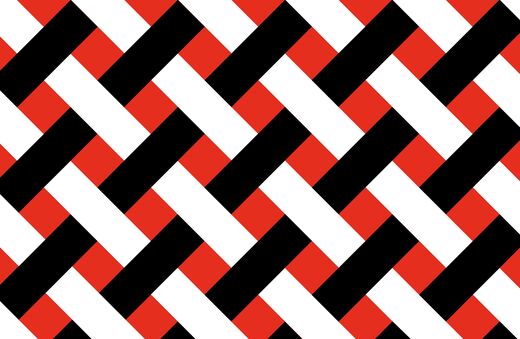
The United States as well as Europe have seen a return of right-wing tendencies in the political landscape. And this rise of a (new) political right has in turn infected our physical and digital landscapes as well. Philosopher and Thomas Mann Fellow Armen Avanessian invites to an evening of comparative spatial and political investigation: how are buildings, structures and monuments sites for a political struggle for meaning, myth and hegemony? How did the ‘hinterland’ morph into an ideological fringe? Are new technologies neutral tools, equally wielded on both sides of the aisle, or they themselves a cause for populism and polarization? Join Avanessian and his guests at NAVEL on December 6, when they will be hot on the heels of political extremists in Europe, the US, and online.
Stephan Trüby (Institute for Principles of Modern Architecture, Stuttgart) will present his research from the European context. The results of the project have been collected in the Rechte Räume edition of the Berlin-based ARCH+ magazine and aim to fundamentally re-politicize architectural discourse: “right-wing spaces” aren't discussed with regard to “good” or “bad” architecture but with a view towards how politics claims spaces.
After his presentation, Armen Avanessian’s American guests are invited to take the conversation into the local context. Safiya Noble (UCLA) will discuss right-wing space creation and infrastructure online, as well as the inherent prejudices, injustices and racism of algorithmic architecture. Jason Luger (UC Berkeley) will take a look at the American urban and regional fringe and the suburbanization of the right.
Armen Avanessian studied philosophy and political science in Vienna and Paris. He has taught at the Freie Universität Berlin, Columbia University, Yale University as well as various art academies in Europe and the US. In Berlin, Avanessian is the editor at large at Merve Verlag and runs the theory program "Avanessian and Enemies" at the internationally acclaimed theatre Volksbühne.
Jason Luger is an urban geographer and lecturer in the UC Berkeley College of Environmental Design. His research focuses on urban space: the politics of space, the networks of space, and the interface between digital space and place. In particular, he is interested in authoritarian urban space, offline and online.
Safiya Umoja Noble is an Associate Professor at UCLA in Information Studies and the Co-Director of the UCLA Center for Critical Internet Inquiry. She is the author of a best-selling book on racist and sexist algorithmic bias in commercial search engines, Algorithms of Oppression: How Search Engines Reinforce Racism (NYU Press).
Stephan Trüby is a professor and director of the Institute for Architecture and Cultural Theory (IGmA) at the University of Stuttgart. His publications include Exit-Architecture. Design between War and Peace(2008), Germania, Venezia. The German Entries to the Venice Architecture Biennale since 1991 (2016, with Verena Hartbaum) and History of the Corridor (2018). He is a permanent contributor to the journal ARCH+.
Location:
NAVEL
1611 S Hope Street
Los Angeles, CA 90015
RSVP here for free:
https://withfriends.co/event/3078529/ring_wing_media_spaces
In cooperation with NAVEL

Der Villa Aurora & Thomas Mann House e. V. wird gefördert vom Auswärtigen Amt und von der Beauftragten der Bundesregierung für Kultur und Medien.


Seminar: Futuros posibles #1: La verdad es ciencia es ficción
Mexico City
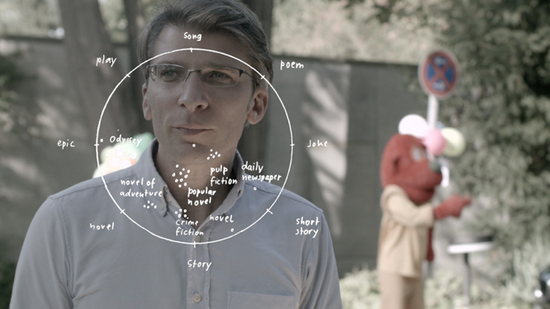
Philosopher and Thomas Mann Fellow Armen Avanessian is leading a two-art seminar at Museo Tamayo in Mexico City. The first part is a screening of his movie Hyperstition, the second part will be an open discussion about the movie and two introductory texts on speculative realism and accelerationism, which will be distributed to the particpants beforehand. During the seminar, Armen Avanessian will also talk about some of his recent books published in Spanish: Aceleracionismo. Caja Negra Editora. Miamificación y Realismo Especulativo. Materia Obscura Editorial.
Armen Avanessian studied philosophy and political science in Vienna and Paris. After earning his Ph.D. in literature, he worked as a freelance journalist, editor, and on staff for various publishers in Paris and London. From 2007·2014, he taught at the Free University Berlin. In 2011 and 2012, Avanessian was Visiting Fellow at the German Departments of Columbia University and Yale University, respectively. In recent years, he taught as guest professor at art academies in Europe and the US (CalArts). Avanessian is the founder of the bilingual research platform Spekulative Poetik (www.spekulative-poetik.de) and of the Bureau of Cultural Strategies (www.bureauforculturalstrategies.com), as well as editor and publisher of a book series at MERVE Verlag. He also coordinates a weekly series on philosophical theory at the Volksbühne. His books and anthologies have been translated into various languages.
Location:
Av. Paseo de la Reforma 51
Polanco, Bosque de Chapultepec I Secc, Miguel Hidalgo
11580 Ciudad de México, CDMX, Mexico
RSVP here
Villa Aurora & Thomas Mann House e. V. is supported by the German Federal Foreign Office and Federal Government Commissioner for Culture and the Media.


"Introduction: Metaphysics" - Book Launch with Armen Avanessian
Los Angeles

"Future Metaphysics," a new book by Thomas Mann Fellow Armen Avanessian, is to be launched not in a single event, but in a series of real, speculative and symbolic “book launches.” The book launches are an ongoing site of recursive encounters between Avanessian and Los Angeles artists and institutions.
"Future Metaphysics" was originally commisioned as a series of experimental texts corresponding to each room of the Moscow Museum of Modern Art. A series of events now generate from each of the book’s chapters, and unfold across divergent contexts of academic and cultural institutions. LA artists Scarlett Kim, Eric Fanghanel and Parch Es, respond to Avanessian’s activities in the form of microcultural productions: performative strategies, relational scores and media interventions. The collision and intersection between them launches Future Metaphysics, repeatedly and unrelentingly, in a multiplicity of directions. The series captures not only the proposals of the book but the dynamics of the writing process and institutional logics at play. Avanessian and artists contaminate and alienate each other, abolishing the distinction between theory and practice, and rewriting the terms of the “book launch.” A web of connections extend outward from the book like tendrils of slime that assemble and disassemble contingently: from Germany to the US, from Thomas Mann House to Los Angeles universities, from major institutions to grassroots interventions, and from academic environment to art installation.
The event "Introduction: Metaphysics" is a joint book launch between Avanessian and artist Warren Neidich. They will discuss their new books "Future Metaphysics" and "Glossary of Cognitive Activism," respectively. Material from previous book launches and the authors’ work will punctuate their discussion contingently.
Armen Avanessian studied philosophy and political science in Vienna and Paris. After completing his dissertation in literature, he worked at the Free University Berlin from 2007–2014. He has previously been a Visiting Fellow in the German Department at Columbia University and the German Department at Yale University as well as Visiting Professor at various art academies in Europe and the US. In Berlin, Avanessian is the editor at large at Merve Verlag and in charge of the theory program at the internationally acclaimed theatre Volksbühne. He is a co-founder of the bilingual research platform Spekulative Poetik (www.spekulative-poetik.de), conducting a series of events, translations and publications. His work is translated into various languages. Forthcoming in German are two monographs, One plus One and I –I (Merve, 2019), both written in collaboration with Anke Hennig. Forthcoming in English is Future Metaphysics (Polity, 2019).
Find more information about the book and the event series here.
Location:
Sunday, December 15 at Hauser & Wirth
3pm-5pm
901-909 E 3rd St,
Los Angeles, CA 90013
The event is free for the public
An Evening of Music with Michael Volle and Bill Kinderman
Los Angeles
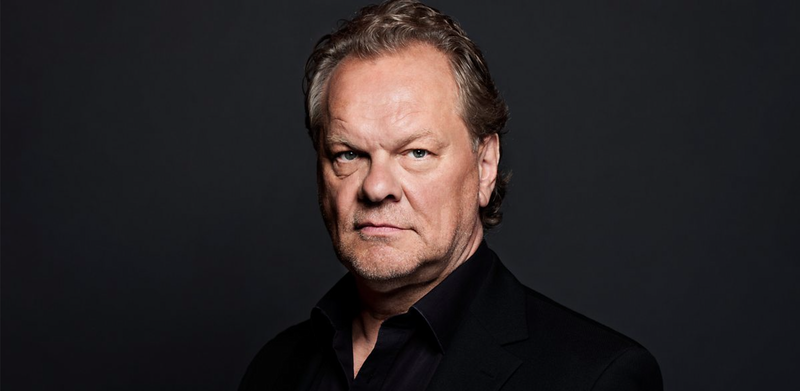
Thomas Mann described the German art song as its own “world of emotions and affections.” Already in his childhood, he admired the songs of Schubert, Schumann, Franz, Brahms, Liszt and the “first post-Wagnerian enunciations.” Due to his friendship with the conductor and pianist Bruno Walter, musical evenings became an integral part of the life in the Mann family. Mann had a passion for especially Schumann. “There is nothing more beautiful to listen to,” he said about Schumann’s song Zwielicht, which he admires as the “lyrical amalgamation of word and sound in a song.”
In the spirit of the Mann’s musical salons, the acclaimed baritone Michael Volle will visit San Remo Drive for an evening of music. Volle will be accompanied by pianist William Kinderman, Professor at the Herb Alpert School of Music (UCLA).
Michael Volle is one of the most sought-after singers of our time. The baritone is a mainstay at opera houses like the Metropolitan Opera New York, the State Operas in Munich and Vienna, the Teatro alla Scala Milan and the Royal Opera House. He is one of the leading interpreters of German repertoire. This includes the title roles in Wagner‘s Der fliegende Holländer, Wotan/Wanderer in the Ring des Nibelungen as well as roles by Richard Strauss such as Barak (Die Frau ohne Schatten). Volle is also a dedicated Lied singer and frequent guest at prestigious festivals and the world’s most renowned concert halls and orchestras.
William Kinderman was born in 1952 in Philadelphia, USA. He studied philosophy at the University of Vienna and music at Yale and the University of California, Berkeley, where he received his PhD in 1980. The most notable of his piano teachers was Dieter Weber at the Hochschule für Musik in Vienna. Kinderman has received awards from the Alexander von Humboldt Foundation and the Social Sciences and Humanities Research Council of Canada. He is holder of the Leo M. Klein and Elaine Krown Klein Chair in Performance Studies and professor of music at the UCLA Herb Alpert School of Music.
Program
| Richard Wagner | Blick ich umher in diesem edlen Kreise (Tannhäuser) |
| Robert Schumann | Lieder nach Heinrich Heine |
| Abends am Strand op.45,3 | |
| Der arme Peter I-III op.53,3 | |
| Tragödie I/II op.64,3 | |
| Die Lotosblume op.25,7 | |
| Dein Angesicht, so lieb und schön op.127,2 | |
| Erich Wolfgang Korngold | Mein Sehnen, mein Wähnen (Die tote Stadt) |
| Franz Schubert |
3 italienische Lieder D 911 |
| L'incanto degli occhi (Metastasio) | |
| Il traditor deluso (Metastasio) | |
| Il modo di prender moglie (anonym) | |
| Richard Wagner | Wie Todesahnung.../O du mein holder Abendstern (Tannhäuser) |
| Gustav Mahler | Lieder nach Friedrich Rückert |
| Ich atmet' ein linden Duft | |
| Liebst Du um Schönheit | |
| Blicke mir nicht in die Lieder | |
| Um Mitternacht | |
| Ich bin der Welt abhanden gekommen |
Location
Thomas Mann House
1550 N San Remo Drive
Pacific Palisades, CA 90272
Participation by invitation only.
Villa Aurora & Thomas Mann House e. V. is supported by the German Federal Foreign Office and Federal Government Commissioner for Culture and the Media.


„Dieser absurde Zustand Europas.“
Berlin
Prof. Dr. Friedhelm Marx (University of Bamberg & Thomas Mann Fellow 2020)
„Dieser absurde Zustand Europas.“
Thomas Mann's Visions for Europe during the Weimar Republic
During the crisis years of the Weimar Republic, Thomas Mann attributed increasing importance to the cultural and political unification of Europe. The stronger the nationalist movements (not only) in Germany, the more vehemently he voted in essays and political statements for overcoming the inner-European contradictions, such as in the speech "Europe as a cultural community", which he held on May 18, 1930 at the second Paneuropa Congress held in Berlin.
The talk introduces Thomas Mann's most important ideas and initiatives in Europe, including the media reception of the Weimar Republic, and links them to the aesthetic project of a Europeanization of prose, to which he had already subscribed to with "The Buddenbrooks".







